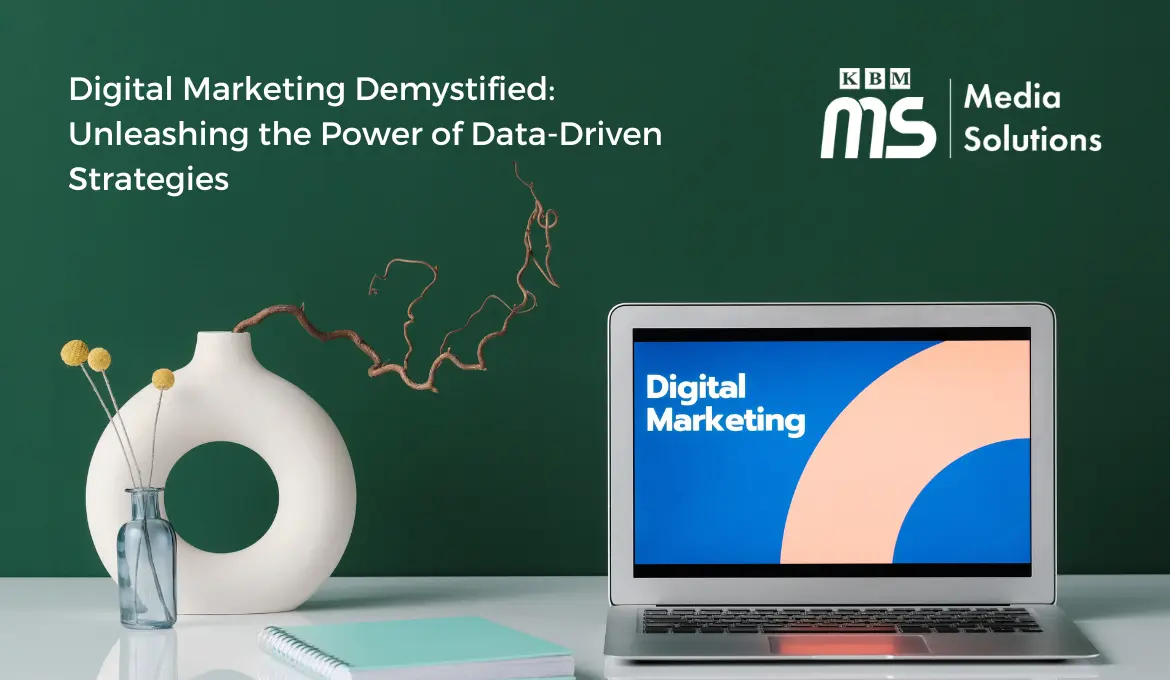Digital Marketing Explained: Unleashing the Power of Data-Driven Strategies

Posted on Oct 03, 2023
The marketing landscape has profoundly transformed in today's digitally connected world. Digital platforms have opened new avenues for businesses to reach their target audiences. Amidst this evolving scenario, the key to unlocking success lies in demystifying digital marketing and harnessing the power of data-driven strategies.
In this article, we will shed light on the significance of data-driven approaches and how they can propel your business to remarkable heights of success.
Understanding Digital Marketing: From Conventional to Digital
The transition from conventional marketing to digital strategies has revolutionised how businesses connect with customers. Traditional methods, such as billboards and printed ads, are now complemented by dynamic digital channels that offer personalisation, engagement, and conversion opportunities like never before.
Data-Driven Decision Making: The Bedrock of Digital Success
In the world of digital marketing, data reigns is significant. Data-driven strategies involve collecting and analysing information about customer behaviour, preferences, and interactions. This data becomes the foundation for informed decision-making, enabling businesses to refine their marketing efforts and create campaigns that work for target audiences.
Leveraging Analytics: Unveiling Insights for Growth
Integrating analytics tools in digital marketing provides businesses with a wealth of insights. From website traffic patterns to user engagement metrics, analytics unveil valuable information that guides strategy refinement. By deciphering these insights, businesses can optimise campaigns, improve user experiences, and drive growth.
Personalisation and Targeting: Crafting Relevant Content
Generic marketing messages are a thing of the past. Data-driven strategies allow businesses to deliver highly personalised content to individual customers. By analysing consumer data, companies can create tailor-made messages that resonate with their audience's unique needs and preferences, leading to higher engagement and helping in conversions.
Search Engine Optimisation (SEO) and Data Analysis
SEO plays a pivotal role in digital marketing, and data analysis is the backbone that supports its effectiveness. By analysing keyword trends, monitoring search engine rankings, and studying user behaviour, businesses can refine their SEO strategies for improved visibility and relevance, driving more organic traffic.
Email Marketing and Segmentation: Precision in Communication
Email marketing, a potent tool in the digital arsenal, and data-driven segmentation take its effectiveness to new heights. By segmenting audiences based on preferences, behaviours, and demographics, businesses can deliver tailored messages that resonate with recipients, leading to higher open rates, click-throughs, and conversions.
Social Media Insights: Shaping Strategies for Success
Social media platforms are treasure troves of data that offer insights into user behaviour, interests, and engagement patterns. By analysing this data, businesses can shape their social media strategies, identify trends, and create content that resonates with their audience, fostering deeper connections and driving brand loyalty.
Digital Marketing Characterisation
Digital marketing is characterised by constant evolution, demanding businesses to adapt and innovate. Data-driven strategies have emerged as the North Star guiding companies through this dynamic landscape. The adage goes, "In God we trust, all others bring data," which holds for digital marketing success.
Data-driven Strategies
Data-driven strategies empower businesses to make informed decisions, deliver personalised experiences, and optimise campaigns for maximum impact. In a world where consumers are bombarded with content, data-driven marketing cuts through the noise and deliver messages that matter. It is no longer about casting a wide net but throwing the proper catch.
As the digital world continues to evolve, integrating data-driven strategies becomes non-negotiable. Businesses harnessing data's power will find themselves at the forefront of innovation, equipped to navigate the complexities of the digital landscape, and poised to achieve sustainable growth.
Conclusion
In conclusion, the explanation of digital marketing revolves around understanding that every data point tells a story. By translating these stories into actionable insights, businesses can decipher the digital marketing landscape and master it, creating impactful campaigns that resonate with their audience and drive their success forward.